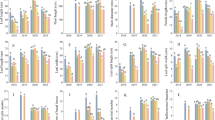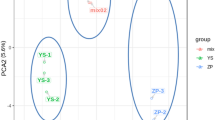Abstract
Resveratrol-enriched rice (RR) includes the stilbene synthase gene for resveratrol synthesis and the phosphinothricin-N-acetyltransferase gene for glufosinate tolerance. To investigate unintended effects resulting from RR’s genetically modified chemical composition, 56 polar and nonpolar secondary metabolites were analyzed with gas chromatography–mass spectrometry in RR and conventional non-transgenic rice. Rice was cultivated during two seasons along three representative climatic regions in the Republic of Korea. Principal components analysis was used to visualize chemical composition differences among rice samples. The results showed that chemical composition was more influenced by growing year and location than by whether or not the rice was transgenic. Pearson’s correlations and hierarchical clustering analysis also indicated no difference in the biochemical structures of RR versus non-transgenic rice. In addition, the glufosinate-ammonium treatment did not significantly change RR chemical composition.




Similar content being viewed by others
References
James C (2015) 20th anniversary (1996–2015) of the global commercialization of biotech crops and biotech crop highlights in 2015. ISAAA Brief No. 51, ISAAA, Ithaca, NY
Hu T, Zhu S, Tan L, Qi W, He S, Wang G (2016) Overexpression of OsLEA4 enhances drought, high salt and heavy metal stress tolerance in transgenic rice (Oryza sativa L.). Environ Exp Bot 123:68–77
Ye X, Al-Babili S, Kloti A, Zhang J, Lucca P, Beyer P, Potrykus I (2000) Engineering the provitamin A (beta-carotene) biosynthetic pathway into (carotenoid-free) rice endosperm. Science (New York, N.Y.) 287:303–305
Baek SH, Shin WC, Ryu HS, Lee DW, Moon E, Seo CS, Hwang E, Lee HS, Ahn MH, Jeon Y, Kang HJ, Lee SW, Kim SY, D’Souza R, Kim JH, Hong ST, Jeon JS (2013) Creation of resveratrol-enriched rice for the treatment of metabolic syndrome and related diseases. PLoS ONE 8:e57930
Bertelli AA, Das DK (2009) Grapes, wines, resveratrol, and heart health. J Cardiovasc Pharmacol 54:468–476
Dohadwala MM, Vita JA (2009) Grapes and cardiovascular disease. J Nutr 139:1788S–1793S
Leifert WR, Abeywardena MY (2008) Cardioprotective actions of grape polyphenols. Nutr Res 28:729–737
Vislocky LM, Fernandez ML (2010) Biomedical effects of grape products. Nutr Rev 68:656–670
Baek SH, Chung HJ, Lee HK, D’Souza R, Jeon YJ, Kim HJ, Kweon SJ, Hong ST (2014) Treatment of obesity with the resveratrol-enriched rice DJ-526. Sci Rep 4:3879
Lee TH, Seo JO, Do MH, Ji E, Baek SH, Kim SY (2014) Resveratrol-enriched rice down-regulates melanin synthesis in UVB-Induced guinea pigs epidermal skin tissue. Biomol Ther (Seoul) 22:431–437
Lee TH, Subedi L, Wahedi HM, Park YU, Kim SY (2016) Resveratrol-enriched rice protects human skin against UVB-induced photoaging. FASEB J 30:lb557
Harrigan GG, Ridley WP, Riordan SG, Nemeth MA, Sorbet R, Trujillo WA, Breeze ML, Schneider RW (2007) Chemical composition of glyphosate-tolerant soybean 40-3-2 grown in Europe remains equivalent with that of conventional soybean (Glycine max L.). J Agric Food Chem 55:6160–6168
Kim MS, Baek SA, Park SY, Baek SH, Lee SM, Ha SH, Lee YT, Choi J, Im KH, Kim JK (2016) Comparison of the grain composition in resveratrol-enriched and glufosinate-tolerant rice (Oryza sativa) to conventional rice using univariate and multivariate analysis. J Food Compost Anal 52:58–67
Park SY, Lee SM, Lee JH, Ko HS, Kweon SJ, Suh SC, Shin KS, Kim JK (2012) Compositional comparative analysis between insect-resistant rice (Oryza sativa L.) with a synthetic cry1Ac gene and its non-transgenic counterpart. Plant Biotechnol Rep 6:29–37
Chang Y, Zhao C, Zhu Z, Wu Z, Zhou J, Zhao Y, Lu X, Xu G (2012) Metabolic profiling based on LC/MS to evaluate unintended effects of transgenic rice with cry1Ac and sck genes. Plant Mol Biol 78:477–487
Charlton A, Allnutt T, Holmes S, Chisholm J, Bean S, Ellis N, Mullineaux P, Oehlschlager S (2004) NMR profiling of transgenic peas. Plant Biotechnol J 2:27–35
Zhou J, Ma C, Xu H, Yuan K, Lu X, Zhu Z, Wu Y, Xu G (2009) Metabolic profiling of transgenic rice with cryIAc and sck genes: an evaluation of unintended effects at metabolic level by using GC-FID and GC–MS. J Chromatogr B 877:725–732
Hoekenga OA (2008) Using metabolomics to estimate unintended effects in transgenic crop plants: problems, promises, and opportunities. J Biomol Tech 19:159–166
Kim JK, Park SY, Lee SM, Lim SH, Kim HJ, Oh SD, Yeo Y, Cho HS, Ha SH (2013) Unintended polar metabolite profiling of carotenoid-biofortified transgenic rice reveals substantial equivalence to its non-transgenic counterpart. Plant Biotechnol Rep 7:121–128
RDA (2012) A guideline for the safety assessment of genetically modified crop. Rural Development Administration, Jeonju
Park SY, Park WT, Park YC, Ju JI, Park SU, Kim JK (2012) Metabolomics for the quality assessment of Lycium chinense fruits. Biosci Biotechnol Biochem 76:2188–2194
Kim TJ, Lee KB, Baek SA, Choi J, Ha SH, Lim SH, Park SY, Yeo Y, Park SU, Kim JK (2015) Determination of lipophilic metabolites for species discrimination and quality assessment of nine leafy vegetables. J Korean Soc Appl Biol Chem 58:909–918
Frank T, Röhlig RM, Davies HV, Barros E, Engel K (2012) Metabolite profiling of maize kernels genetic modification versus environmental influence. J Agric Food Chem 60:3005–3012
Bergman C, Xu Z (2003) Genotype and environment effects on tocopherol, tocotrienol, and γ-oryzanol contents of Southern US rice. Cereal Chem 80:446–449
Park SY, Kim JK, Jang JS, Lee SY, Oh S, Lee SM, Yang CI, Yeo Y (2015) Comparative analysis of nutritional composition between the disease-resistant rice variety OsCK1 and conventional comparators. Food Sci Biotechnol 24:225–231
Volkmar K, Hu Y, Steppuhn H (1998) Physiological responses of plants to salinity: a review. Can J Plant Sci 78:19–27
Camacho D, De La Fuente A, Mendes P (2005) The origin of correlations in metabolomics data. Metabolomics 1:53–63
Acknowledgment
This work was supported by a Grant from the Incheon National University Research Grant in 2014, Republic of Korea.
Author information
Authors and Affiliations
Corresponding authors
Electronic supplementary material
Below is the link to the electronic supplementary material.
Rights and permissions
About this article
Cite this article
Kim, M.S., Baek, SH., Park, S.U. et al. Targeted metabolite profiling to evaluate unintended metabolic changes of genetic modification in resveratrol-enriched rice (Oryza sativa L.). Appl Biol Chem 60, 205–214 (2017). https://doi.org/10.1007/s13765-017-0265-0
Received:
Accepted:
Published:
Issue Date:
DOI: https://doi.org/10.1007/s13765-017-0265-0




